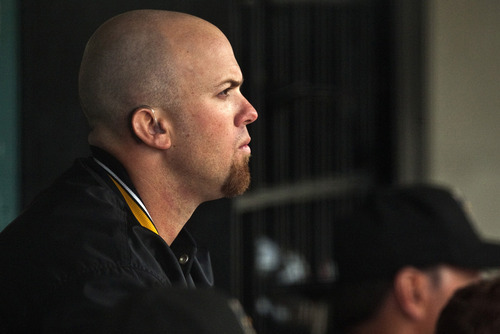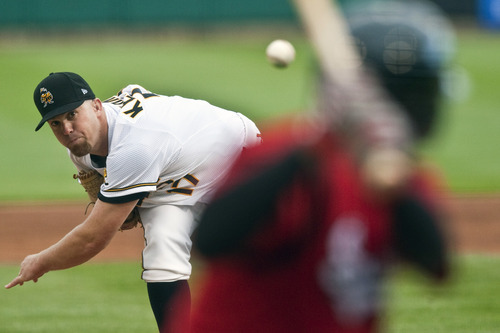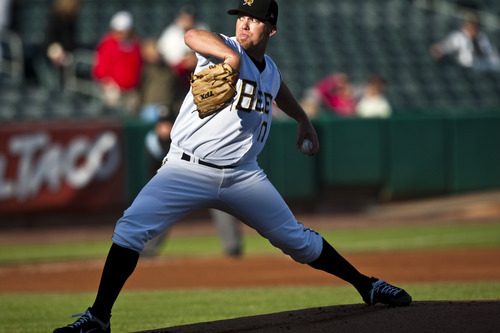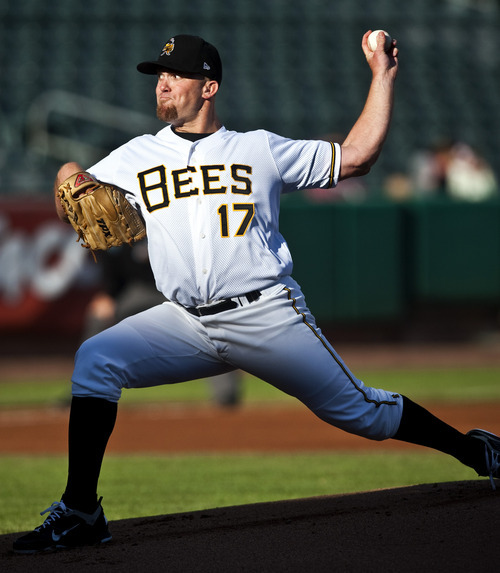This is an archived article that was published on sltrib.com in 2011, and information in the article may be outdated. It is provided only for personal research purposes and may not be reprinted.
Salt Lake Bees pitcher Ryan Ketchner was settling into his seat behind home plate, getting ready to chart pitches for a teammate last month before a game in Oklahoma City, as he traditionally does between starts. As he readied his radar gun, clipboard and pen, he glanced out at the field and saw a group of students from the Oklahoma School for the Deaf signing the national anthem as it played before the first pitch.
The scene brought a smile to Ketchner's face as he watched Francis Scott Key's lyrics interpreted into sign language.
He couldn't hear the music, either.
The Salt Lake left-hander, you see, is also deaf. And with just one more call-up, a promotion from the Bees to the Los Angeles Angels, the parent club, he would become the first deaf pitcher since 1908 to play in the major leagues.
In the deaf community, Ketchner is already a star. After learning he was in their midst that day, a teacher at the Oklahoma school asked the Bees hurler if he would join the students for a few minutes after the game. Ketchner happily obliged.
"Is that him? Is that him?" Kristen McCurdy recalled her small group of students asking when Ketchner approached. "They were in awe of him. Excited to meet him."
Ketchner had a simple message for the youngsters. He is living proof, he told them, that someone sharing the same hearing disability could achieve great things.
He said, "You can do anything you want," McCurdy recalled.
It's the same message Ketchner received years ago from his mentor and friend Curtis Pride — the first deaf position player in the modern era to make it to the majors.
"We have had to work much harder than most hearing ballplayers just to get the front office to ignore our disability and focus more on our ability and how we can help the team win," said Pride, now the head baseball coach at Gallaudet University in Washington, D.C., a school for the deaf and hearing impaired.
Pride, said Ketchner, "taught me to work hard and to believe in myself."
Even setting aside his disability, Ketchner's road through professional baseball has been challenging. Arm and shoulder injuries have sidetracked him at various points in his career.
"I watched a lot of baseball on TV, wishing I was playing," Ketchner said.
Yet he has made it this far, to Triple-A, because of a competitive streak that makes him formidable not only on the mound but also off the field in Bees' team pingpong tournaments.
Which is another way of saying that Ketchner is just one of the guys, happily taking, or dishing out, insults during the tournaments with a look or a sound, taking particular joy in impersonating an opponent's ragged serve.
Similarly, on the field, there is little thought given to Ketchner's deafness. When the lefty and Salt Lake catcher Kevin Richardson meet on the mound, or Bees manager Keith Johnson pays a visit to the hill, they share easy verbal communication.
"As long as you face him and he can see your lips, then he can understand you," Johnson said. The only difference is "his focus has to be a little higher at all times."
Added the Bees manager: "This is something he has. It's not who he is. We don't look at it as a disability."
Neither does Marilyn Call, director of the Robert G. Sanderson Community Center for the Deaf and Hard of Hearing in Taylorsville. She is quick to point out that any hurdles that exist are purely language barriers.
"Deafness is not a physical handicap in any way," said Call, who has two children who are deaf. She also suffers from hearing loss. "It's a visual language."
As in Oklahoma City, Ketchner has been an inspiration to Utah's deaf community.
"We know all about him. He's one of those amazing people," Call said. "Part of the deaf culture is sports."
Ketchner was just 16 months old when his disability was diagnosed. His parents, Tim and Kim Ketchner, quickly decided to begin teaching him sign language.
"We wanted to make it as easy for him as possible," said Tim Ketchner.
Always, there was the hope that Ryan's hearing would develop. But his parents were also realists.
"Many parents don't teach their kids sign language," Call said. "But I can say that 99.9 percent of deaf people, by the time they can make their own choice, embrace sign language."
Even as versed as he is in sign language and verbal communication, conversing can be an exercise, both for Ketchner and those speaking to him. It takes time, for instance, for Ketchner and media members to make themselves understood in postgame interview sessions.
"It's been a lot of work," acknowledged the pitcher, who wears two hearing aids that help detect vibrations.
Tim Ketchner introduced baseball to his son as a way to interact with other children. By the time the boy was 6, he was playing T-ball and later Little League. And once he reached high school, Ketchner was dominating other kids. During his junior year at John I. Leonard High School in Greenacres, Fla., Ketchner threw a no-hitter.
Baseball, he said, made him "feel normal."
"You don't have to talk or carry on a conversation to play baseball," Tim Ketchner said. "He's always been so competitive, even way back in T-ball.
"At first, people are a little intimidated, until they get to know him. Then he becomes one of the guys."
After high school, Ketchner was drafted by Seattle in the 10th round of the 2000 Major League Draft, and he quickly moved up in the Mariners' farm system. His best season came in 2002, when he won 14 games for Inland Empire of the California League.
Then came arm troubles and three surgeries. The Angels are Ketchner's fifth organization, and he has pitched well for the Bees.
Ketchner has some work to do before he can make the final jump to the Angels. Ketchner, a finesse pitcher, needs to improve his pitch command to be considered for a spot on Los Angeles' 40-man roster.
"He's competitive and poised, a great guy in the clubhouse," said Abe Flores, the Angels' minor league director of player development. "But he really has to be pristine with his three pitches to pitch at the major league level. There's a lot to like, but he really has to improve. That command would have to vastly improve."
If Ketchner doesn't make it there, it won't be for a lack of effort. His determination is what has kept him going every step of the way.
"I know he will not let anything stop him from achieving his dream," Pride said.
martyr@sltrib.comTwitter: @tribmarty.com —
About Ryan Ketchner
Born in Wellsville, N.Y., Salt Lake Bees left-handed pitcher Ryan Ketchner, age 29, is attempting to become what is believed to be the first deaf pitcher to reach the big leagues since Luther Taylor in 1908.
Ketchner, a 10th-round draft pick out of high school by the Seattle Mariners, graduated from John I. Leonard High School in Greenacres, Fla., where he tossed a no hitter his junior year.
This season with the Bees, Ketchner is 3-2 in 11 starts with a 3.65 earned-run average. He is scheduled to make his next start Saturday or Sunday. —
Bees' homestand
Salt Lake is in the midst of an eight-game homestand at Spring Mobile Ballpark, 77 W. 1300 South, which runs through Thursday. Each has a 7:05 p.m. start, except for this Sunday's game versus Fresno, which is set for 2:05 p.m. Tickets can be purchased at the Spring Mobile Ballpark box office, by visiting slbees.com, or by calling 801-325-2273.









